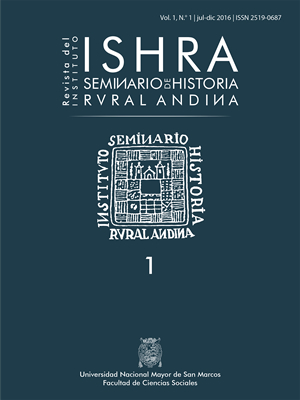La historia económica en el Seminario de Historia Rural Andina
DOI:
https://doi.org/10.15381/ishra.v1i1.13043Keywords:
Perú, historiografía, historia económica, Seminario de Historia Rural Andina, Pablo MaceraAbstract
Este artículo analiza el rol del Seminario de Historia Rural Andina y de Pablo Macera en la formulación de los criterios teóricos y metodológicos que guiaron los primeros trabajos de la moderna historia económica peruana de la segunda mitad del siglo XX. Se distinguen tres etapas en el continuo proceso de producción bibliográfica del SHRA (1966-1978, 1979-2000 y 2001-2015) destacando las perspectivas de los investigadores actuantes al interior de cada una de estas en el marco de los debates historiográficos ocurridos durante los últimos cincuenta años.
The Peruvian economical history and the role of the Seminario de Historia Rural Andina
This article analyses the role of the Seminario de Historia Rural Andina and of Pablo Macera designing methodological and theoretical criteria guiding the first research efforts of modern Peruvian economical history in the second half of the XX Century. Such research has been divided into three phases: 1966-1978; 1979-2000; and 2001-2015. Each phase is marked by specific characteristics of the theoretical orientation of the investigators in the context of the history debates that have occurred in the past five decades.
Keywords: Peru; historiography; economic history; Seminar of Andean Rural History; Pablo Macera.
Downloads
Downloads
Published
Issue
Section
License
Copyright (c) 2017 ISHRA, Revista del Instituto Seminario de Historia Rural Andina

This work is licensed under a Creative Commons Attribution-NonCommercial-ShareAlike 4.0 International License.
AUTHORS RETAIN THEIR RIGHTS:
a. Authors retain their trade mark rights and patent, and also on any process or procedure described in the article.
b. Authors retain their right to share, copy, distribute, perform and publicly communicate their article (eg, to place their article in an institutional repository or publish it in a book), with an acknowledgment of its initial publication in the ISHRA, Revista del Instituto Seminario de Historia Rural Andina.
c. Authors retain theirs right to make a subsequent publication of their work, to use the article or any part thereof (eg a compilation of his papers, lecture notes, thesis, or a book), always indicating the source of publication (the originator of the work, journal, volume, number and date).






